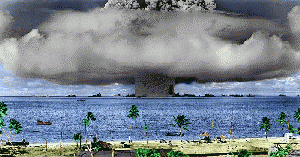By Medea Benjamin & Pam Bailey
The negotiations this week in Geneva between Iran and the "P5+1" (the five permanent members of the United Nations Security Council -- Britain, China, France, Russia and the United States -- plus Germany) offer a promising vehicle for avoiding another destructive war. The talks came on the heels of a virtual uprising by the American people that stopped President Barack Obama's plan to attack Syria, clearly demonstrating their desire to solve conflicts at the negotiation table rather than at the point of a gun.
However, Israel and its allies in the U.S. Congress continue to lobby against a deal that would meet Iran in the middle, insisting on a "zero-enrichment" policy that is a deal-breaker for Iran.
The Israeli cabinet said in a statemen t Tuesday that "Israel does not oppose Iran having a peaceful nuclear energy program. But as has been demonstrated in many countries, from Canada to Indonesia, peaceful programs do not require uranium enrichment or plutonium production. Iran's nuclear weapons program does."

(Image by (From Wikimedia) Operation_Crossroads_Baker_(wide).jpg: United States Department of Defense (either the U.S. Army or the U.S. Navy) derivative work: Wojot / , Author: See Source) Details Source DMCA
by Wikipedia
The "elephant in the room': Israel and the bomb
The Israeli cabinet's statement is more than ironic, in light of Israel's own nuclear-weapons program -- often called the world's "worst-kept secret" because of the taboo surrounding any public discussion of its existence.
The Washington Post's Walter Pincus is one of the few journalists openly questioning this obvious hypocrisy. He writes, "When the Israeli prime minister asked (at the UN), "Why would a country that claims to only want peaceful nuclear energy, why would such a country build hidden underground enrichment facilities?' I thought Dimona."
Israel's nuclear facility at Dimona, a city in the Negev desert, reportedly has six underground floors dedicated to activities such as plutonium extraction, production of tritium and lithium-6, for use in nuclear weapons.
Whereas Iran signed the Nonproliferation Treaty (NPT), giving the international community the right to demand inspections and controls, Israel has not -- and is therefore not subject to external oversight.
According to Avner Cohen, author of "Israel's Bargain with the Bomb," David Ben-Gurion began planning how to arm Israel with a nuclear shield even before the creation of the Jewish state, soon after the United States dropped its own atomic payload on Hiroshima and Nagasaki. The first president of Israel took action to initiate a nuclear-development project by the end of the new state's first decade, with its successful "birth" on the eve of its 1967 occupation of the West Bank and East Jerusalem.
The U.S. government got wind of the project and objected strenuously. But when the Israelis brought it to fruition regardless and refused to give up their new arsenal, a covert agreement was struck between Prime Minister Golda Meir and President Richard Nixon -- rather like the old U.S. policy of "don't ask, don't tell" for gays in the military. The Israelis agreed to keep their newfound strength under wraps, and the Americans pledged to pretend it didn't exist.
Cohen uses the Hebrew term amimut (opacity) to describe the taboo that developed within Israel around any sort of public acknowledgement of its nuclear arsenal -- which estimates peg at up to 200 warheads. To this day, there is total censorship within Israel of any mention that the weapons exist, and the United States actively plays along.
Edward Snowden's predecessor
In fact, there is an eerie similarity between the stories of Israeli whistleblower Mordechai Vanunu, a nuclear technician who revealed details of Israel's nuclear weapons program to the British press in 1986, and Edward Snowden. Both held junior positions in organizations serving the defense industry, in which they had access to sensitive national secrets. Both became convinced their employers were responsible for immoral acts and decided to violate their oaths of secrecy to tell the world about them. They both shared what they learned with a British newspaper and set off an international storm. And both have been persecuted since then by their governments, in retaliation for their leaks.
While Snowden has so far evaded capture by his government, Vanunu spent 18 years in prison, including more than 11 in solitary confinement. Although released in 2004, he has been subjected to a broad array of restrictions on his speech and movement, including several re-arrests for giving interviews to foreign journalists and attempting to leave Israel. Yet, just as activists, foreign governments and others would never have known the U.S. government is tapping their emails and phone calls without Snowden, the world would have known very little -- if anything -- about Israel's weapons of mass destruction without Vanunu.
(Note: You can view every article as one long page if you sign up as an Advocate Member, or higher).





